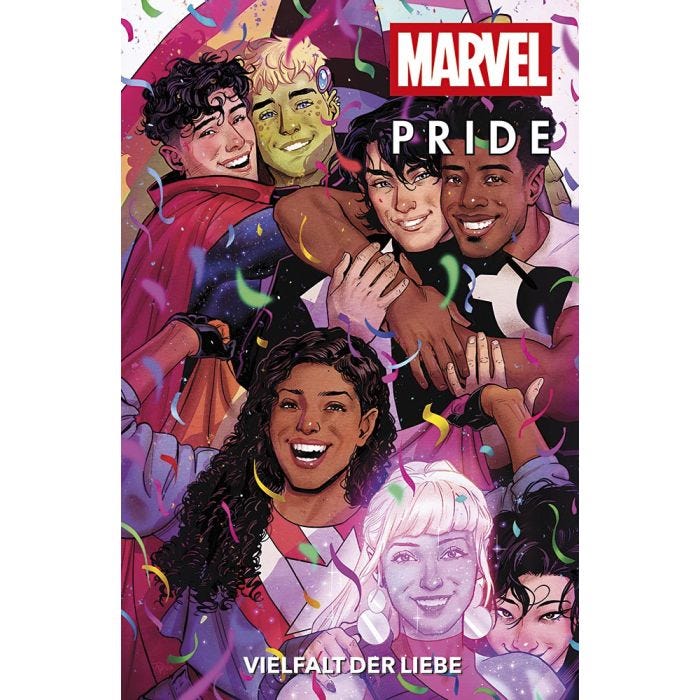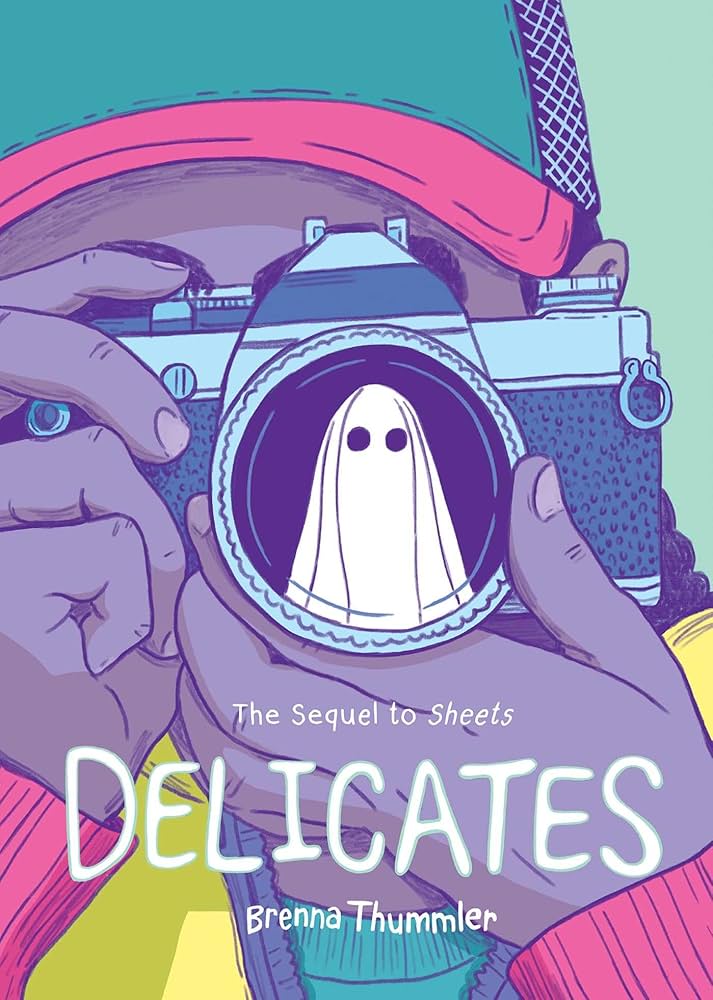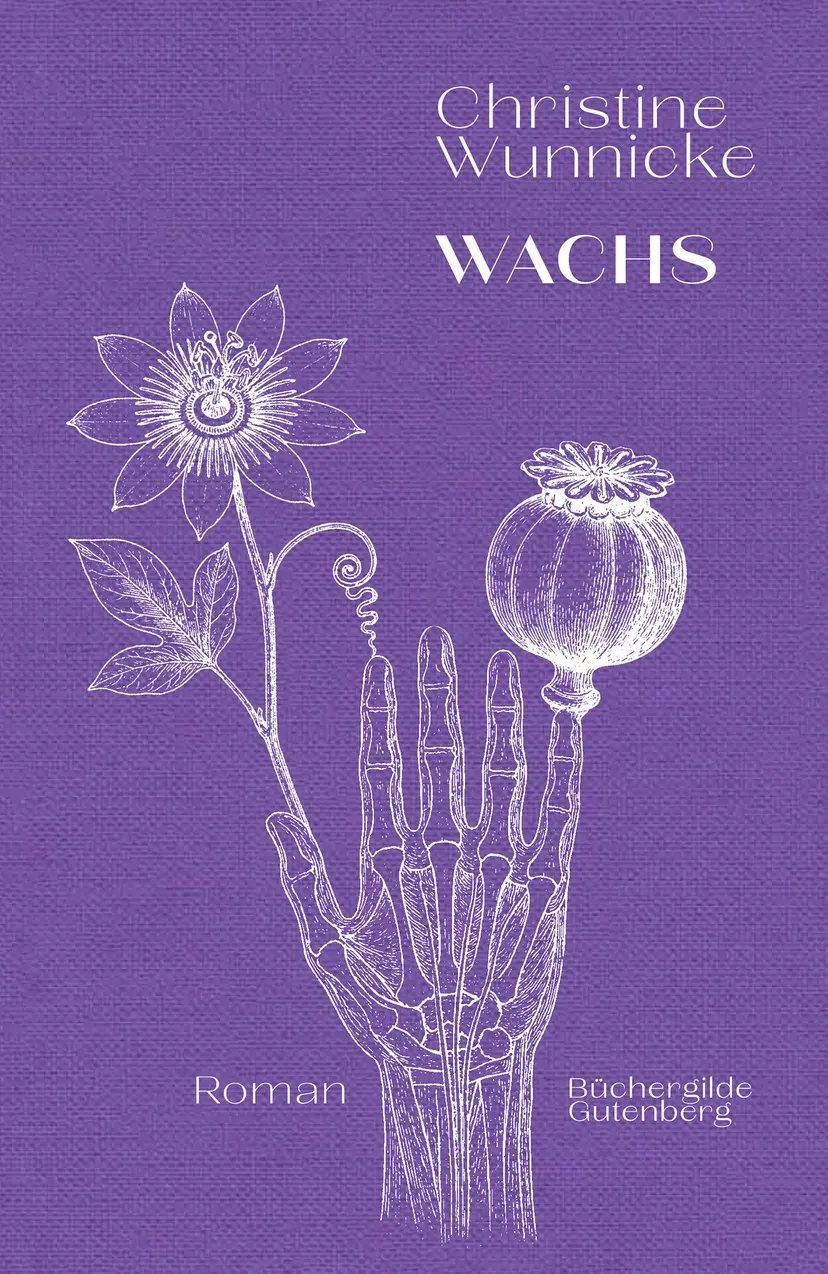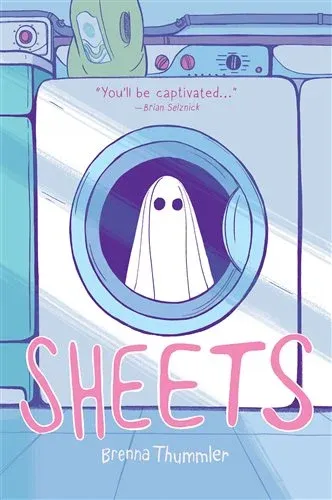blauschrift finished reading Marvel Pride by Christopher Cantwell

Marvel Pride by Christopher Cantwell
Das Marvel-Universum steht für die bunte Vielfalt der Gesellschaft - und nicht zuletzt für alle Formen der Selbstfindung und Liebe …
So happy to be here now - having quit GR years ago and then not tracking books at all. Will always post in German and English (but mainly on German books).
💙 Love "social reading". Have a queer-feminist-bookclub, going to (independant) book stores with a friend and enjoy live author readings. 💙 Into contemporary + classic novels, non-ficion, graphic novels. queer-feminist and critical approaches.
Blog: www.blauschrift.de/ List of blue books: bookwyrm.social/list/3694/s/blue-books Mastodon: literatur.social/@blauschrift Vernissage: vernissage.pnpde.social/@blauschrift
🐦 Profile pic: Is one of my 5 budgies / parrots.
This link opens in a pop-up window
64% complete! blauschrift has read 16 of 25 books.

Das Marvel-Universum steht für die bunte Vielfalt der Gesellschaft - und nicht zuletzt für alle Formen der Selbstfindung und Liebe …

Marjorie Glatt's life hasn't been the same ever since she discovered a group of ghosts hiding in her family's laundromat. …
@LibZed Zumindest fürs neue Känguru werde ich auf jeden Fall wieder dabei sein (habe die als Hörbuch in Reihe mit Qualityland1 in Schleife an zum Einschlafen. O, 7fache Geschwindigkeit 😁🙃 Eins mehr macht die Reihe länger, ist gut). Soll nächstes Jahr kommen.

Die nahe Zukunft. Deutschland wird von einem perfekten Algorithmus gesteuert: Der »Würfel« ermöglicht den Menschen ein sorgenfreies Leben, zahlt allen …
@ulf_der_freak @giornodelsole Hiii Charlotte Roche Ultra hier, die hier mit Verspätung drüber stolpert und sich auf jeden Fall auch für die Qualität der Bücher "schämt".
Warum das so gezündet hat, denke ich, war einerseits durch den Tabubruch in der Zeit und die "Schaulust", ("hihi iih Hämorriden Blumenkohl") andererseits die wirklich gute parallele Promotion. CR hat richtig viele und gute Interviews gegeben. Hatte ein komplett anderes Buch erwartet 🙃 (vergleichbar vlt mit El Hotzo, der viele wichtige Dinge über toxische Männlichkeit gesagt hat und dazu ein mMn absolut enttäuschendes Buch abgeliefert hat, das ich mir auch anders vorgestellt hatte).
Das so viele Jahre später nach zu lesen, kann gewiss nur enttäuschen. "Damals" war es auch schon schlecht geschrieben, aber hat einen Zeitgeist getroffen, grandios vermarktet mit CR?
@ulf_der_freak @giornodelsole Hiii Charlotte Roche Ultra hier, die hier mit Verspätung drüber stolpert und sich auf jeden Fall auch für die Qualität der Bücher "schämt".
Warum das so gezündet hat, denke ich, war einerseits durch den Tabubruch in der Zeit und die "Schaulust", ("hihi iih Hämorriden Blumenkohl") andererseits die wirklich gute parallele Promotion. CR hat richtig viele und gute Interviews gegeben. Hatte ein komplett anderes Buch erwartet 🙃 (vergleichbar vlt mit El Hotzo, der viele wichtige Dinge über toxische Männlichkeit gesagt hat und dazu ein mMn absolut enttäuschendes Buch abgeliefert hat, das ich mir auch anders vorgestellt hatte).
Das so viele Jahre später nach zu lesen, kann gewiss nur enttäuschen. "Damals" war es auch schon schlecht geschrieben, aber hat einen Zeitgeist getroffen, grandios vermarktet mit CR?
War auf einer Lesung bzw Performance des Trios. Mit Soundeffekten, Livedrawing, spontaner Kreativität und dem Bühnentalent von Kling hatte das durchaus was! Da gab's halt Ausschnitte, die auch gut in einen Kontext gesetzt wurden. Nur auf dieser Erinnerung basierend ringe ich mir 3 Sterne ab.
Habe es jetzt bei der Onleihe ausgeliehen und bin sehr froh, nix bezahlt zu haben. Alles sehr wirr, dachte manchmal, versehentlich Seiten geskippt zu haben. Aber der Plot hing wirklich einfach nur so "luftig in der Luft".
Im Grunde ein Remix von bekannten und ehrlich gesagt teilweise in die Jahre gekommenen Kling-Themen bzw. der immer ähnlich angesetzten Figuren-Perspektive. Das wäre OK, wenn sich alles zusammen auch progressiv weiter entwickeln würde. Warum geht es da nicht mehr vorwärts?
Gibt Witziges, klar. Aber gerade der wiederkehrende, so unnötige Sexismus enttäuscht mich. Hatte auch nicht mit Brutalität gerechnet oder damit, dass es erst mit dem …
War auf einer Lesung bzw Performance des Trios. Mit Soundeffekten, Livedrawing, spontaner Kreativität und dem Bühnentalent von Kling hatte das durchaus was! Da gab's halt Ausschnitte, die auch gut in einen Kontext gesetzt wurden. Nur auf dieser Erinnerung basierend ringe ich mir 3 Sterne ab.
Habe es jetzt bei der Onleihe ausgeliehen und bin sehr froh, nix bezahlt zu haben. Alles sehr wirr, dachte manchmal, versehentlich Seiten geskippt zu haben. Aber der Plot hing wirklich einfach nur so "luftig in der Luft".
Im Grunde ein Remix von bekannten und ehrlich gesagt teilweise in die Jahre gekommenen Kling-Themen bzw. der immer ähnlich angesetzten Figuren-Perspektive. Das wäre OK, wenn sich alles zusammen auch progressiv weiter entwickeln würde. Warum geht es da nicht mehr vorwärts?
Gibt Witziges, klar. Aber gerade der wiederkehrende, so unnötige Sexismus enttäuscht mich. Hatte auch nicht mit Brutalität gerechnet oder damit, dass es erst mit dem zweiten Teil abgeschlossen sein wird und hier im Showdown abbricht. Am Ende also alles ein weiterer Profitbaustein? Mein Tipp: Kein Geld dafür ausgeben.

Eine philosophische Terrororganisation im Kampf gegen fake news und alternative Fakten
Die Aktivistengruppe Aletheia kämpft für die absolute Wahrheit, …

Eine philosophische Terrororganisation im Kampf gegen fake news und alternative Fakten
Die Aktivistengruppe Aletheia kämpft für die absolute Wahrheit, …
(English below) Die „Sheets“-Serie hatte ich schon so lange auf meiner Liste. Teil 1 hat mich sehr berührt und ich habe manche Seiten lange angeschaut und wirken lassen. Die Farbgebung spricht so stark wie die Handlung und teilweise noch mehr als die Sprechblasen. Emotionen kommen so sehr stark rüber: Traurigkeit, Trauer und Einsamkeit der Protagonistin. Genau so stark wirkt dann aber auch die behutsam aufgebaute Verbindung zu einer zweiten Figur. Dass der erste Teil nicht tragisch abschließt habe ich dringend gebraucht. Und das Ende hat mir auch eine große, positive Gänsehaut gegeben.
Teil 2 und 3 warten schon schon auf dem Reader auf mich ✨
(English) The ‘Sheets’ series had been on my list for so long. Part 1 moved me deeply, and I spent a long time looking at some of the pages and letting them sink in. The colour scheme is as powerful as the plot, …
(English below) Die „Sheets“-Serie hatte ich schon so lange auf meiner Liste. Teil 1 hat mich sehr berührt und ich habe manche Seiten lange angeschaut und wirken lassen. Die Farbgebung spricht so stark wie die Handlung und teilweise noch mehr als die Sprechblasen. Emotionen kommen so sehr stark rüber: Traurigkeit, Trauer und Einsamkeit der Protagonistin. Genau so stark wirkt dann aber auch die behutsam aufgebaute Verbindung zu einer zweiten Figur. Dass der erste Teil nicht tragisch abschließt habe ich dringend gebraucht. Und das Ende hat mir auch eine große, positive Gänsehaut gegeben.
Teil 2 und 3 warten schon schon auf dem Reader auf mich ✨
(English) The ‘Sheets’ series had been on my list for so long. Part 1 moved me deeply, and I spent a long time looking at some of the pages and letting them sink in. The colour scheme is as powerful as the plot, and in some cases even more so than the speech bubbles. The emotions come across very strongly: the sadness, grief and loneliness of the protagonist. But the carefully constructed connection to a second character is just as strong. I really needed the first part not to end tragically. And the ending gave me heavy, positive goosebumps.
Parts 2 and 3 are already waiting for me on my reader ✨
(English below) Das hatte ich schon im Mai in England in der Hand und habe es dann wegen Platz / Gewicht im Koffer nicht gekauft. Kein Problem mehr mit meinem neuen E-Reader 💪 Was in „Spent“ auf die Waage kommt: miteinander verwobene Story Lines rund um Alison, ihre Partnerin, deren queeren Community und Ziegen Sanctuary. Aufgebaut auf realitäts(nahen) Vorbildern steht alles mit einem Hufen auch im Fiktionalen. Ich mag diese Doppelbödigkeit, die sich durchzieht: Farmleben vs Influencerin auf Social Media, Polycule in jüngeren und älteren Beziehungen, Alison in der Novel vs. ihre dort gefeaturte Streaming-Serie , Blickwinkel auf die Familiengeschichte durch Alisons Augen und die ihrer schmerzhaft konservativen Schwester uswusw.
Es ist wie immer bei Bechdel: Zum drin Versinken und mitfühlen. Es gibt die rückhaltendgebende Wärme der queeren chosen family. Leiden und Ragen über die politische Weltlage. Lachenund Awwww-en über die kleinen Ziegen.
Auf dem E-Reader habe ich …
(English below) Das hatte ich schon im Mai in England in der Hand und habe es dann wegen Platz / Gewicht im Koffer nicht gekauft. Kein Problem mehr mit meinem neuen E-Reader 💪 Was in „Spent“ auf die Waage kommt: miteinander verwobene Story Lines rund um Alison, ihre Partnerin, deren queeren Community und Ziegen Sanctuary. Aufgebaut auf realitäts(nahen) Vorbildern steht alles mit einem Hufen auch im Fiktionalen. Ich mag diese Doppelbödigkeit, die sich durchzieht: Farmleben vs Influencerin auf Social Media, Polycule in jüngeren und älteren Beziehungen, Alison in der Novel vs. ihre dort gefeaturte Streaming-Serie , Blickwinkel auf die Familiengeschichte durch Alisons Augen und die ihrer schmerzhaft konservativen Schwester uswusw.
Es ist wie immer bei Bechdel: Zum drin Versinken und mitfühlen. Es gibt die rückhaltendgebende Wärme der queeren chosen family. Leiden und Ragen über die politische Weltlage. Lachenund Awwww-en über die kleinen Ziegen.
Auf dem E-Reader habe ich immer wieder rangezoomt, um Bechdels toll gemalten oder witzigen Details genauer anzuschauen. Werde ich immer wieder mal lesen.
Auf jeden Fall ein Empfehlung von mir!
I already had this in my hands in England in May, but didn't buy it because of space/weight in my suitcase. No more problem with my new E-Reader 💪 What comes into play in “Spent”: interwoven storylines around Alison, her partner, their queer community, and goat sanctuary. Based on (near) reality, everything is also rooted in fiction. I like the ambiguity that runs through it: farm life vs. social media influencer, polycule in younger and older relationships, Alison in the novel vs. her streaming series featured there, perspectives on family history through Alison's eyes and those of her painfully conservative sister, etc., etc.
As always with Bechdel, it's something to immerse yourself in and empathize with. There is the supportive warmth of the queer chosen family. Suffering and rage about the political world situation. Laughter and “awwws” about the little goats.
On my e-reader, I kept zooming in to take a closer look at Bechdel's beautifully painted or funny details. I will read it again and again.
Definitely a recommendation from me!

Eine Liebesgeschichte, so schön, so verwegen, wie nur Christine Wunnicke sie schreibt. Schauplatz ist Frankreich im 18. Jahrhundert, das vorrevolutionäre …

Dies ist eine Liebesgeschichte. Sie spielt im Juni, im Juli, im August in Adana, dreitausend Kilometer weit weg von Berlin. …

When Marjorie, a practical teen in charge of her family's laundry business, encounters Wendell, a ghost seeking purpose in the …

Afrika vor sechs Millionen Jahren. Grüner Urwald weicht der Savanne, und die Affen beschließen: „Runter vom Baum!“ Aber mit dem …